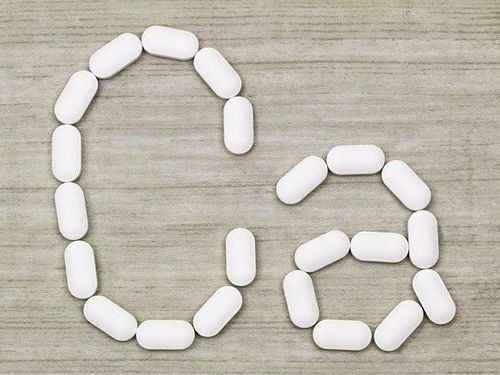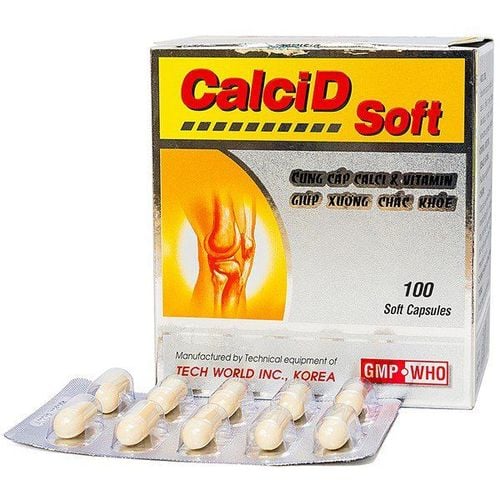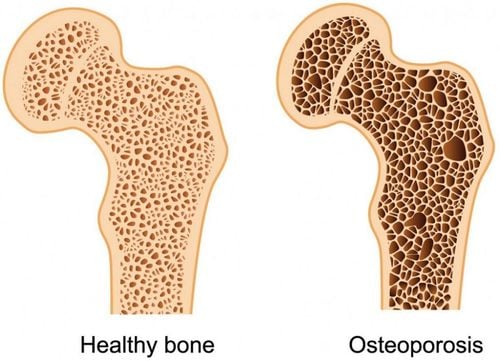This is an automatically translated article.
Adequate intake of vitamin K and vitamin D is necessary for good health because both these vitamins play an important role in human health, especially with the cardiovascular system and the skeletal system.1. Overview of vitamin D and vitamin K
Vitamin D and vitamin K are both classified as fat-soluble vitamins and are essential for the human body. They are abundant in fatty foods, and their absorption into the circulation is increased when digested with fat.Also known as the “sunshine vitamin,” vitamin D is found in high concentrations in fish oils and fatty fish, but vitamin D is also produced by the skin when exposed to sunlight. One of the basic functions of vitamin D is to promote the absorption of calcium ions and maintain a stable calcium concentration in the body. Vitamin D deficiency can lead to osteoporosis. Vitamin K is found in many green vegetables, fermented foods as well as in some foods of animal origin such as cheese, animal liver, egg yolk. Vitamin K is necessary for blood clotting and promotes calcium deposition in bones and teeth.
In summary, vitamin D and vitamin K are fat-soluble nutrients that play an important role in the human body's calcium metabolism.
2. Interaction between vitamin D and vitamin K

Trong quá trình chuyển hóa canxi, vitamin D và vitamin K hoạt động cùng nhau và hỗ trợ nhau
2.1 Role of vitamin D One of the main functions of vitamin D is to maintain a balanced blood calcium level. Vitamin D accomplishes this goal through two mechanisms:
First: Enhances calcium absorption: Vitamin D promotes calcium absorption from various foods that the human body consumes. Second: Regulate calcium levels: when the human body does not add the necessary amount of calcium, vitamin D will mobilize calcium from the bones in the body to ensure their concentration is always at a balanced level in the blood. Maintaining calcium levels in the blood at a reasonable level is important because in addition to acting on the bone and teeth system, calcium also has many other essential functions in the human body.
During the period of not supplementing with enough calcium, the human body has no choice but to use calcium stores from the bones even though doing this can lead to a decrease in bone mineral and cause osteoporosis according to time.
2.2 The role of vitamin K As suggested above, vitamin D is responsible for ensuring blood calcium levels at a level that meets the body's needs. However, vitamin D cannot fulfill its role when calcium levels are low. Then the role of vitamin K will be promoted. Vitamin K regulates calcium in the human body in the following ways:
Promotes calcification of bones: Vitamin K activates osteocalcin which is a protein that promotes the deposition of calcium ions in bones and teeth. Reduced mineralization in soft tissues: Vitamin K promotes the GLA protein complex. This is a protein capable of preventing the deposition of calcium ions in soft tissues such as kidneys and blood vessels. There aren't many case-control studies that answer the question of vitamin K's effect on vascular calcification, but more research is still being done. Intravascular calcification is a risk factor for many chronic diseases such as kidney disease and cardiovascular disease.
In summary, one of the main functions of vitamin D is to maintain blood calcium levels at a level sufficient to meet the needs of the human body. Vitamin K promotes calcium deposition in bones and reduces calcification in soft tissues such as blood vessels.
3. Is Vitamin D Harmful Without Vitamin K?

Hiện nay, không có bằng chứng nào đủ mạnh để chứng minh được hàm lượng vitamin D ở mức trung bình có thể gây hại cho cơ thể nếu không được bổ sung đủ vitamin K
Vitamin D poisoning causes hypercalcemia: One of the characteristic manifestations when vitamin D levels are too high is an increase in blood calcium levels. Hypercalcemia leads to calcification of the vascular system: When blood calcium increases, the concentration of calcium and phosphorus in the blood also increases so high that it can be deposited in the vascular system. Calcification of blood vessels is related to cardiovascular diseases: According to many experts, calcification of blood vessels is one of many causes of cardiovascular diseases. Vitamin K deficiency is associated with intravascular calcification: many observational studies have shown a link between low vitamin K levels and an increased risk of intravascular calcification. Oral vitamin K supplements have the ability to prevent intravascular calcification in animals: in a controlled study in rats with an increased risk of calcification, high doses of vitamin K2 prevented the occurrence of calcified plaques inside the vessel lumen. Oral vitamin K supplements may reduce vascular calcification in humans: a controlled study in adult donors providing 500 mcg of vitamin K1 daily for three years slowed systemic calcification. blood vessels about 6%. Supplementing with more vitamin K can reduce the risk of cardiovascular diseases: in people with a diet rich in vitamin K2, the risk of vascular calcification and the risk of cardiovascular diseases is reduced. In summary, vitamin D toxicity can cause vascular calcification while vitamin K allows prevention of this phenomenon.
Although the array of evidence above seems supportive enough, many gaps still exist. While extremely high doses of vitamin D can lead to dangerously high calcium levels and calcification of the blood vessels, low doses of vitamin D can cause long-term harm with no known cause. In 2007, a nutritionist suggested that high doses of vitamin D can reduce vitamin K levels and cause vitamin K deficiency in the body. However, more research is needed before any conclusions can be drawn for this hypothesis.
Currently, there is no strong evidence to show that moderate levels of vitamin D can be harmful to the body if vitamin K is not taken. However, more research is still underway. and has great prospects in the future.
In summary, contemporary scientists are uncertain whether vitamin D supplementation at high doses is actually harmful when vitamin K supplementation is inadequate. The evidence that this matter should be taken as a definite conclusion cannot yet be made at this time.
Vinmec International General Hospital with a system of modern facilities, medical equipment and a team of experts and doctors with many years of experience in medical examination and treatment, patients can rest assured to visit. examination and treatment at the Hospital.
To register for examination and treatment at Vinmec International General Hospital, you can contact Vinmec Health System nationwide, or register online HERE.
Reference source: healthline.com
SEE MORE
What disease does vitamin K deficiency cause? Prevention of vitamin K deficiency and cerebral hemorrhage in children Vitamin K deficiency can cause cerebral hemorrhage in children













